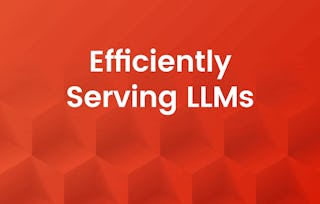In Pretraining LLMs you’ll explore the first step of training large language models using a technique called pretraining. You’ll learn the essential steps to pretrain an LLM, understand the associated costs, and discover how starting with smaller, existing open source models can be more cost-effective.
Pretraining LLMs

(18 reviews)
Recommended experience
What you'll learn
Gain in-depth knowledge of pretraining an LLM, covering data preparation, model configuration, and performance assessment.
Explore model architecture options, including modifying Meta’s Llama models for various sizes and initializing weights randomly or from other models.
Learn innovative pretraining techniques like Depth Upscaling, which can reduce training costs by up to 70%.
Skills you'll practice
Details to know
Only available on desktop
See how employees at top companies are mastering in-demand skills

Learn, practice, and apply job-ready skills in less than 2 hours
- Receive training from industry experts
- Gain hands-on experience solving real-world job tasks

About this project
Instructors


Offered by
How you'll learn
Hands-on, project-based learning
Practice new skills by completing job-related tasks with step-by-step instructions.
No downloads or installation required
Access the tools and resources you need in a cloud environment.
Available only on desktop
This project is designed for laptops or desktop computers with a reliable Internet connection, not mobile devices.
Why people choose Coursera for their career

Felipe M.

Jennifer J.

Larry W.

Chaitanya A.
You might also like
 Status: Free Trial
Status: Free Trial Status: Free Trial
Status: Free Trial Status: Free
Status: FreeDeepLearning.AI
 Status: Free Trial
Status: Free TrialSimplilearn

Open new doors with Coursera Plus
Unlimited access to 10,000+ world-class courses, hands-on projects, and job-ready certificate programs - all included in your subscription
Advance your career with an online degree
Earn a degree from world-class universities - 100% online
Join over 3,400 global companies that choose Coursera for Business
Upskill your employees to excel in the digital economy
Frequently asked questions
In Projects, you'll complete an activity or scenario by following a set of instructions in an interactive hands-on environment. Projects are completed in a real cloud environment and within real instances of various products as opposed to a simulation or demo environment.
By purchasing a Project, you'll get everything you need to complete the Project including temporary access to any product required to complete the Project.
Even though Projects are technically available on mobile devices, we highly recommend that you complete Projects on a laptop or desktop only.